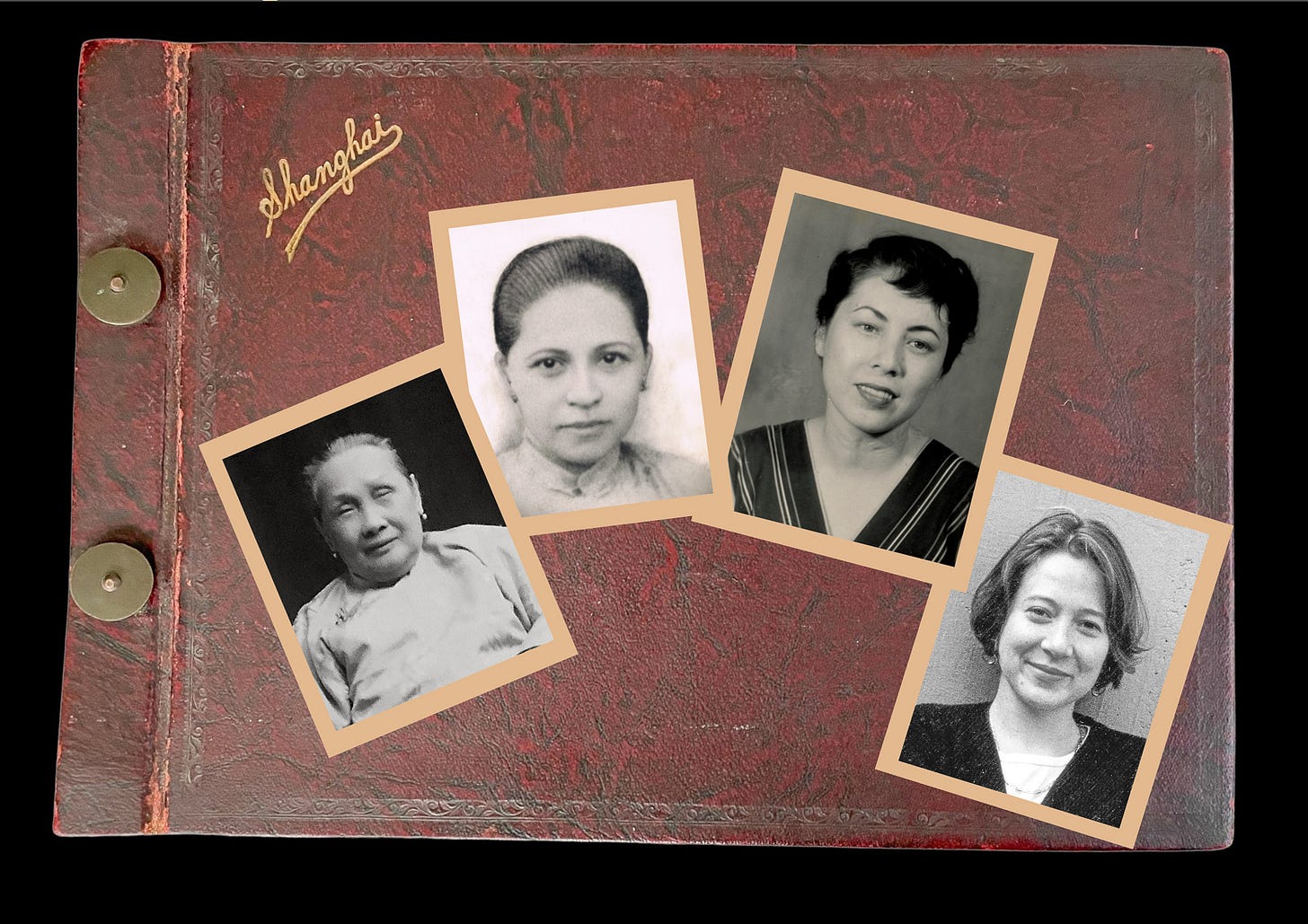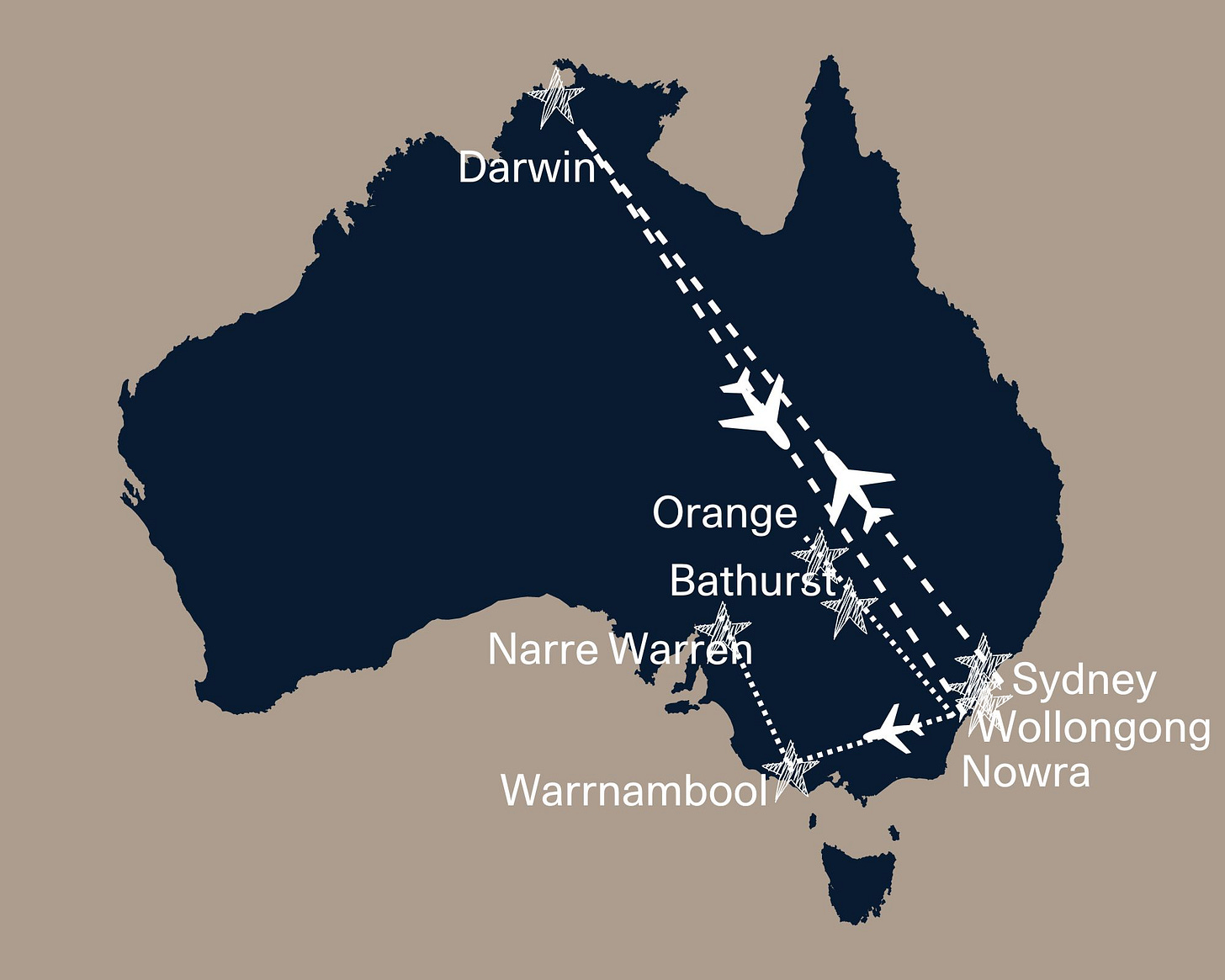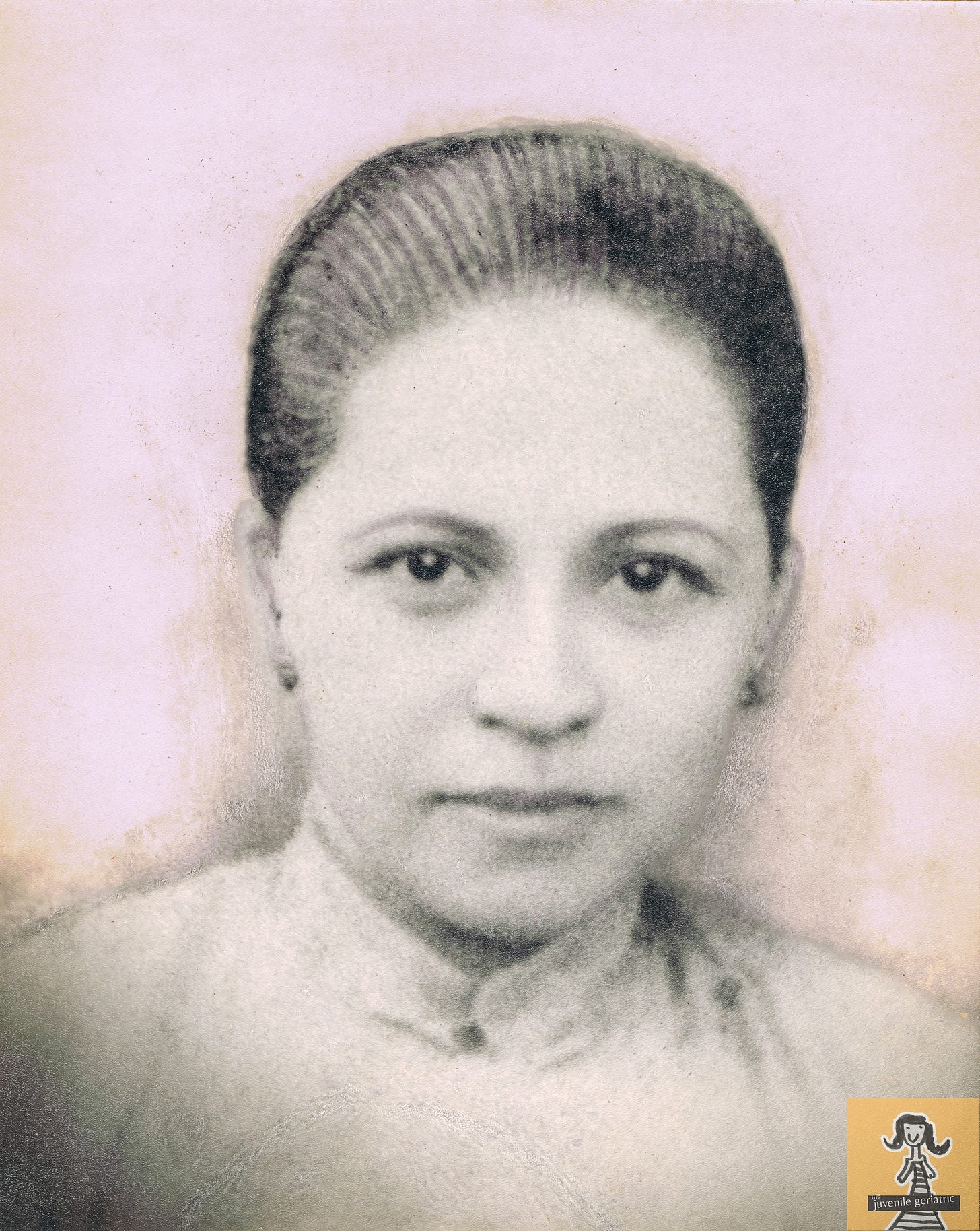Unanswered questions: the women in my family
On tour with Lost in Shanghai, International Women's Day 2024
Greetings from somewhere between Warrnambool and Narre Warren in Victoria.au as the Lost in Shanghai team and I continue our theatre tour. The map’s looking a bit messy as we have covered 10,227.3 kilometres (6354.95 miles) so far, which is pretty exciting. And we have further to travel. My mother’s story has been told in eight wonderful regional theatres and we are now at the three-quarter mark. As publication day coincides with International Women’s Day, I wanted to reflect on some of the women in my past-family and the unanswered questions I have about them.
As I travel one of the books I have with me is a slim edition of Rainer Maria Rilke’s Letters To A Young Poet. Apart from language and passion, I adore the unhurried revelation of Rilke’s letters, the landscapes they cover and to me, most importantly, devotion to a spirit of questioning and living with inner questions that go unanswered at key points in our lives. Let me share this beautiful passage:
“Be patient toward all that is unsolved in your heart and try to love the questions themselves, like locked rooms and like books that are now written in a very foreign tongue. Do not now seek the answers, which cannot be given you because you would not be able to live them. And the point is, to live everything. Live the questions now. “ - Rainer Maria Rilke

So, as I attempt to inhale this spirit of living the questions, here are some thoughts about the women in my life. I won’t talk in-depth about my beloved Mum, Beatrice. Her death, in 2022, still feels too recent and I haven’t fully processed her place in my life. When I’m on stage, sometimes I come to a point in the story, where I glance at a photograph projected behind me and suddenly I remember that Mum isn’t here anymore. In that moment I have to regain my footing. I don’t want to lose my composure during a performance. That would not be a service to the audience.
But I will talk about Mum’s mother, Elsie Mackenzie Greaves. My grandmother Elsie died in 1927 of dysentery, an infectious disease we don’t hear much about anymore in our privileged world. Elsie was in her late thirties and my Mum, Beatrice, was only five. Elsie had given birth to four children and her eldest daughter was ten years older than Mum. Mum had a vague image of Elsie as a gentle woman sitting at a sewing machine. She doesn’t recall going to Elsie’s funeral. In Lost in Shanghai, we developed a refrain that comes whenever Bea or I, for that matter, search for resilience: ‘Don’t Cry Bea. Don’t Cry.’
How did a middle-class woman contracted dysentery in the foreign concessions of Shanghai in 1927? Apparently she caught it from her young son. Her son survived. Elsie died in hospital (I note that it wasn’t a hospital for foreign residents) Did she leave it too late to seek treatment?
But the biggest question I have about my grandmother Elsie, is, was it you, who wanted my Mum sent away from the rest of her family; your husband and her siblings? Why did you want her to away? This story came from a cousin. She heard it from her mother who was very close to Mum when they were growing up.
My Mum, Beatrice, got sent away twice. The first time, after Elsie’s death, was across town to live with Elsie’s sister in a one-room apartment above Uncle Henry and Auntie Winifred’s garages in the grounds of their sixteen-room mansion, Ferryhill House.
The second time Mum got sent away, was by her father, from Shanghai on a ship (the Empress of Canada) bound for Hong Kong in October 1931. This was a painful episode that Mum never forgot. She never saw her father again. Why, did he send her away? Probably because she became ill with diphtheria the previous year and Hong Kong’s climate was considered more suitable. But it also suggests there was dysfunction in the family. I would love to have known what really happened.
The question quest continues about my Chinese great-grandmother Josephine (Ng Jo-shing), who gave birth to three children with my British great-grandfather Alexander Greaves. What exactly was their relationship? Was she a mistress, a sex-worker, a domestic staff member? Where did she come from and how did she happen to be in Shanghai? In those days, relationships between foreigners and locals were known as miscegenation. Ugh. What a horrible world.
Miscegenation (derogatory): sexual relationships or reproduction between people of different ethnic groups, especially when one of them is white.

This (above) is the only photograph I have of Josephine with her three children but even this image elicits yet more questions. Why did Alexander make this visual record of his ‘secret’ family? Did he show it to anyone in his English family? What exactly is Josephine wearing (it looks Japanese)?
Chinese women who were ‘partnered’ in pseudo-colonial bachelor societies like Shanghai and the Treaty Port cities, were kept out of sight. They were either mistresses or they were called ‘domestic helpers’ to disguise the truth of why they lived in a foreigner man’s home.
When Alexander abandoned or left Josephine in the 1890’s or early 1900’s, why did she move to Hong Kong with her children? How did the family survive? And my final question about Grandma Josephine is around her death in Hong Kong during the Second World War. She died during the Japanese occupation. She has a gravestone in the colonial cemetery in Happy Valley. Did the headstone come much later (well after the war and the devastating occupation) and is she really buried there?
I have many more questions about Alexander Greaves, but another time. This is only about the women.
On my Dad’s side, the family research has barely begun. I have the precious original cabinet card of my paternal great-grandmother Mabel Alice Radford born in Alverstoke, England in 1879. Her husband was an officer in the army. Mabel, became a nurse in the Voluntary Aid Detachment helping to rehabilitation injured soldiers in Pimlico Hospital in London in 1916.
Mabel died aged thirty-six of meningitis, contracted from soldiers in the hospital. Her grieving husband and two teenage children left England to live in the treaty ports of China after her death. My questions about Mabel are very simple. What was she like? She gave her life for her country in such a silent and selfless way. I hope she did not suffer too much. Who were you Mabel? Speak to me, somehow!
Finally, my paternal grandmother Ethel Bryan Hutcheon: Gran. This image is Gran as a young wife in Shanghai.
Gran died of cancer when I was sixteen years old. I didn’t have a huge connection with her when I was growing up as we lived in Hong Kong and she lived in Sydney, Australia. However, I have a deep admiration for her youthful curiosity, bringing-up three children while living in China and surviving a pirate attack (yes! That story coming soon). I will always remember her brown-paper packages (tied up with… Sellotape) we received in Hong Kong containing her hand-knitted, scratchy, woollen jumpers, Jaffas and Munchies (quality Australian dog biscuits!).
Sadly, at the time Gran died, cancer screening was not widely available. I remember my grandmother as being unemotional and judgemental. She was a committed Anglican. She sang with a trill. I didn’t realise she spent her last months in a hospice and I did not go to her funeral in Australia. My question for Gran is, when you look back at your life, what did you cherish and what did you regret? But of course, what I’d really love to ask all the women in my family is, tell me your story, in your own words, in your time. Let’s start from the beginning. I want to know. I want to know it all.
Rilke, I fear, who urged his young friend to sit a while with his questions, would be displeased.
Please feel free to leave your comments so that others can read and learn from them! I’m keen to build a community, so let’s put our respectful thoughts out there!









Shyozin Ryori..is the development of the supreme thinking ...such as (??) ...might you not ...learn more ...if you defined/ enquired .. why the British were in Shanghai ....and then built up... your relationships... upon such a basis.......
. For instance unless possibly poor photography....could we comment that your maternal grandmother Elsie bears remarkably strong non Chinese.... features. c/f ....Russia had made considerable inroads into North China.... since the early 1830's...... .safe travel.....